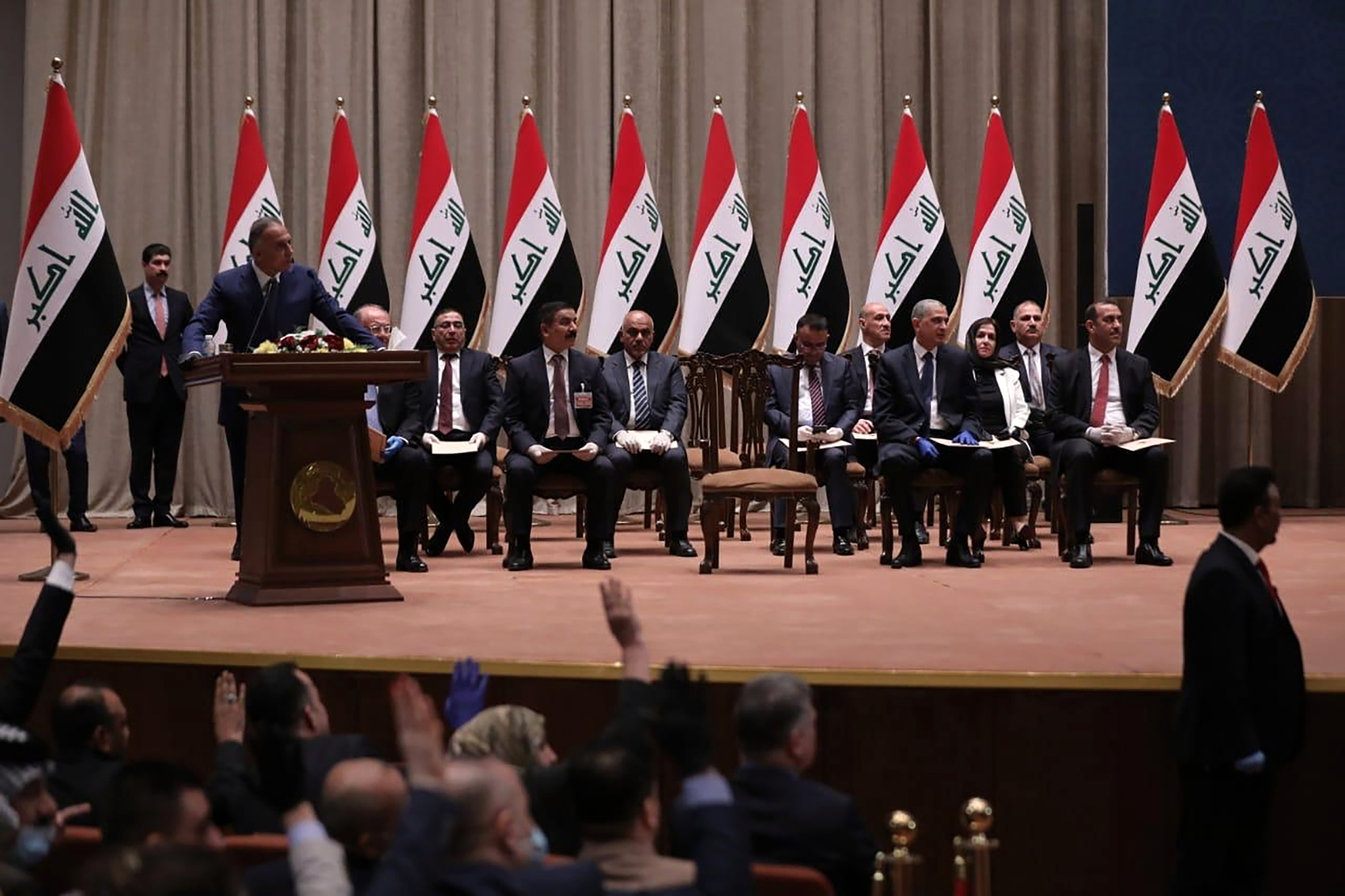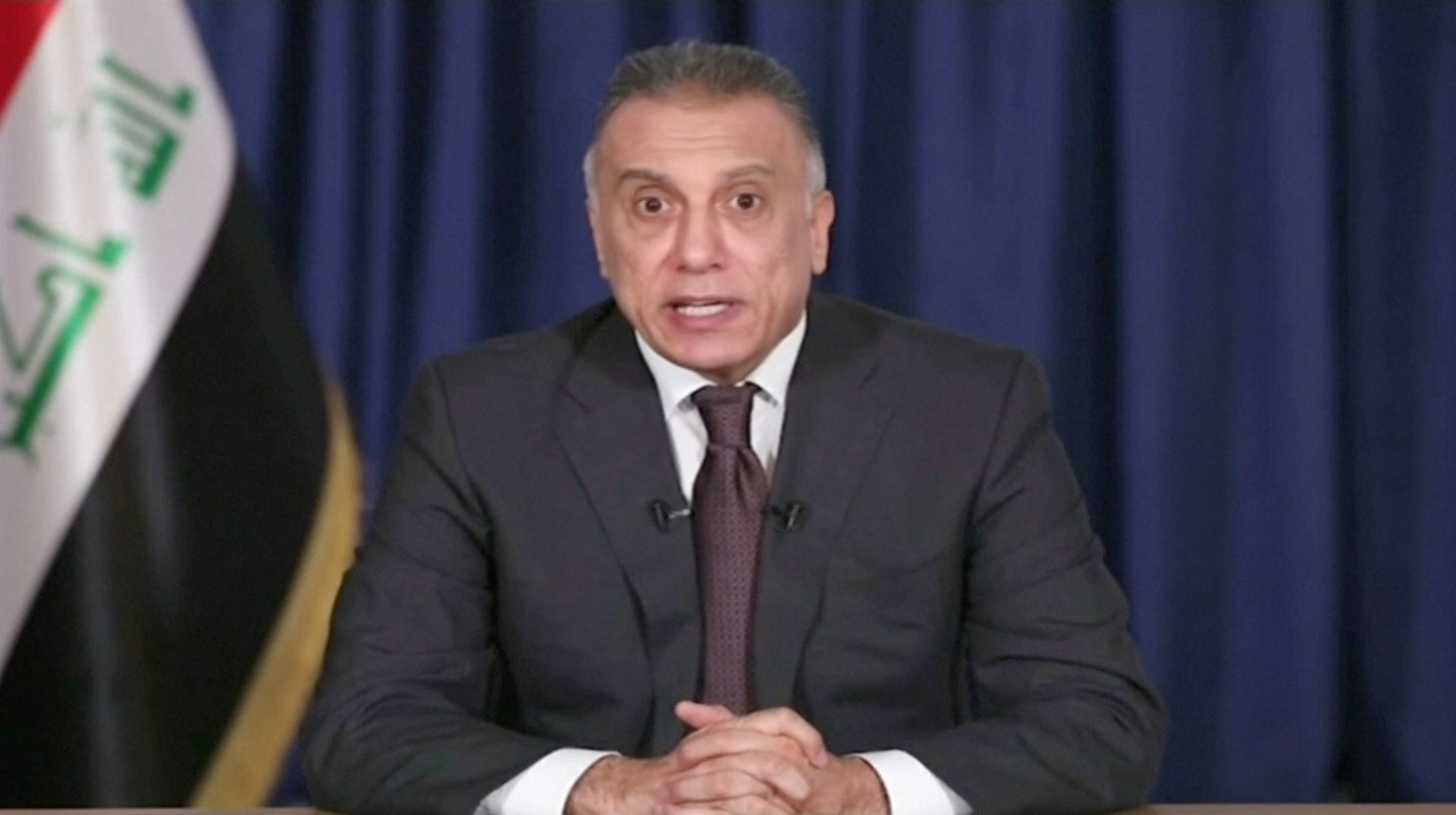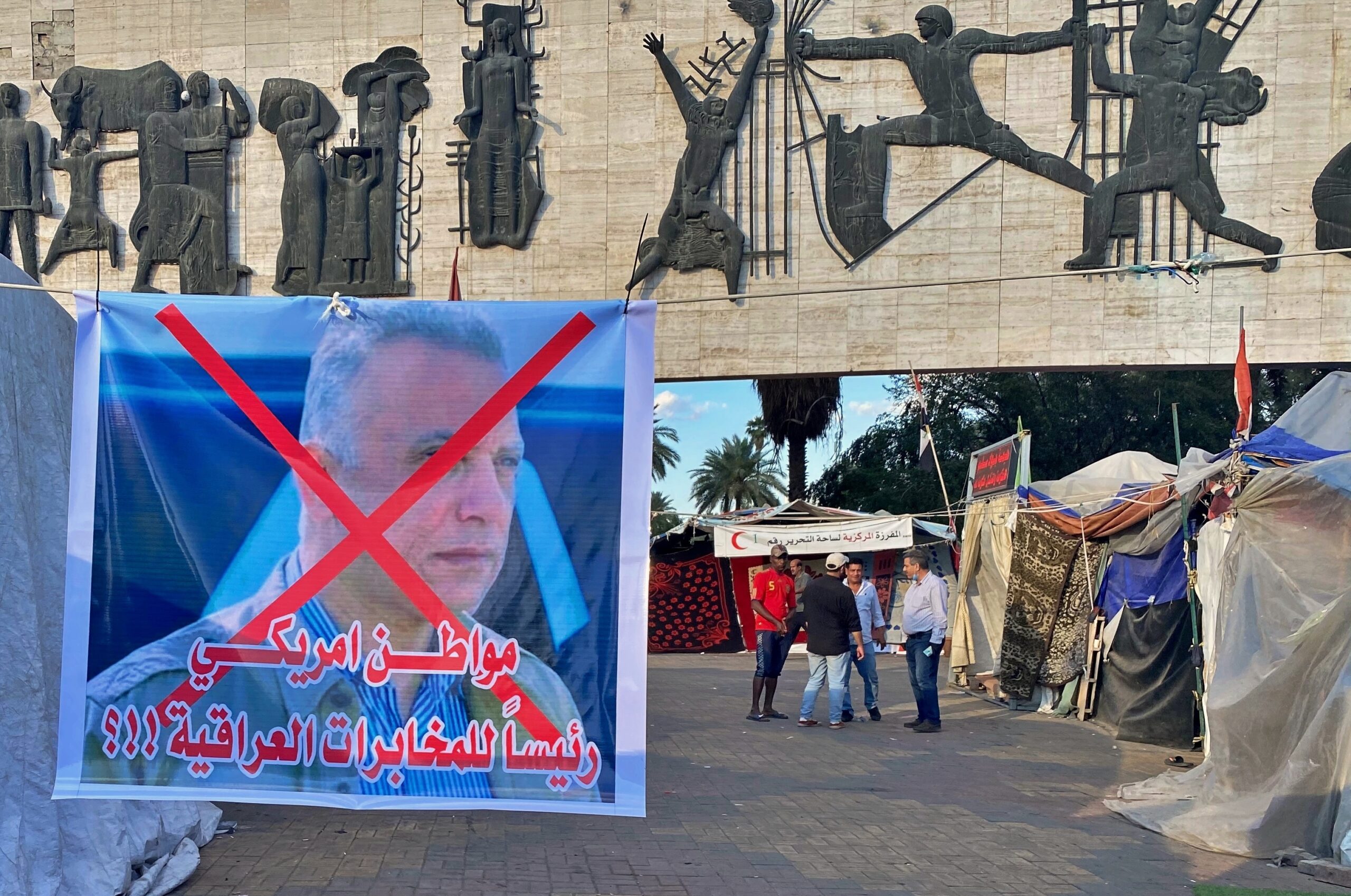The Art of the Possible: Prime Minister Mustafa al-Kadhimi’s Cabinet
Mustafa al-Kadhimi seems to have succeeded where his predecessors mostly failed, forming a Cabinet mainly composed of technocrats, academics, and respected national military figures.

After months of political deadlock, the Iraqi Parliament on May 7 gave a vote of confidence to Prime Minister Mustafa al-Kadhimi’s Cabinet. The process was not easy, and Kadhimi has yet to secure parliamentary support for another seven Cabinet portfolios, including the Ministries of Oil and Foreign Affairs. But politics, after all, is the art of the possible, and Kadhimi seems to have succeeded where his predecessors mostly failed: He is now at the helm of a Cabinet mainly composed of technocrats, academics, and respected national military figures that includes confirmed ministers of defense and the interior. While respecting the fundamental sectarian/ethnic/party distribution key in Iraqi politics since 2003, Kadhimi has signaled that education, competence, and administrative experience count more to him than sect, ethnicity, and political party affiliation. While awaiting the breakdown of political party support for each proposed candidate and the fate of the remaining seven portfolios, some preliminary insights into Kadhimi’s political survival strategy are beginning to emerge.
Iraq has not had a fully functioning government since a wave of political protests – primarily against corruption among the ruling elites of Iraq and Iran’s influence over Iraqi politics – forced Prime Minister Adel Abdul Mahdi to resign in November 2019. Mohammed Tawfiq Allawi and later Adnan al-Zurfi tried but failed to secure a parliamentary vote of confidence, and the ship of Iraq appeared rudderless. Anti-government protests, Iran and the United States settling scores on Iraqi soil, the coronavirus pandemic, and the collapse of the oil markets threatened to sink Iraq further into chaos.
Against this background, Kadhimi emerged as a compromise candidate acceptable to the ruling elites of Iraq, supported by the United States, and not actively opposed by Iran.
Once all 22 cabinet ministers are confirmed by Parliament, the Cabinet will likely include 12 ministers from Shia parties, six Sunni representatives from the Halbousi-led coalition, three from Kurdish parties, and one from a minority group. On May 6, Kadhimi’s proposed, albeit incomplete, Cabinet was composed largely of technocrats with managerial experience from the central administration and academia, or respected national military figures acceptable to most, if not all, political parties.
The Parliament responded fairly well to Kadhimi’s Cabinet picks. Out of a total of 329 Members of Parliament, 233 attended the session and secured quorum, but the number increased to 262 as more parliamentarians took their seats. Indicative of the challenges the new prime minister faces, Kadhimi delayed voting on the important ministers of oil and foreign affairs, as the parties failed to agree on the candidate for the Foreign Ministry, and Shia parties close to Iran reportedly vetoed Kadhimi’s candidate for the Ministry of Oil. The Parliament also rejected Kadhimi’s picks for the Agriculture, Culture, Justice, Migration, and Trade ministries.
Regarding the Cabinet portfolios postponed until further notice, Kadhimi has most likely promised the Foreign Ministry to the Kurds. Viyan Sabri, head of the Kurdistan Democratic Party bloc in the Iraqi Parliament issued a statement before the vote saying the Kurds “will not accept the Foreign Ministry instead of the Finance Ministry.” The Kurdistan Democratic Party position may have changed since the bloc voted for Kadhimi’s Cabinet, and Fuad Hussein, finance minister in the last government, is expected to take over the Foreign Ministry.
There are also rumors that the Ministry of Oil will go to a native of the city of Basra, whose representatives walked out of Parliament in protest as Kadhimi presented his Cabinet without a representative from the south.
While the process prior to the Parliament’s rejection of Kadhimi’s picks for the agriculture, culture, migration, and trade portfolios is unknown, the Ministry of Justice was first offered to Khalid Salam Saeed Shwani, who currently serves as minister of state in the Kurdistan Regional Government. In the face of opposition, allegedly from Mohamed al-Halbousi, parliament speaker and his coalition, Kadhimi presented Abd al-Rahman Mustafa Fattah Ahmad, former governor of Kirkuk, who the Parliament rejected. The Halbousi-led coalition also protested against the candidacy of Ali Allawi for the finance portfolio, but to no avail.
Breakdown of the exact voting pattern among the political parties present in the Parliament is not yet clear, but Kadhimi seems to enjoy support from most Shia parties, including those close to Tehran. According to al-Alam TV’s coverage, the Hadi al-Amiri-led Itilaf al-Fath (Fatah Alliance) gave a vote of confidence to Kadhimi’s Cabinet. So did the Sairoon (Muqtada Sadr’s Reform Alliance), Tayar al-Hikmah al-Watani (National Wisdom Movement), Badr Organization, and former Prime Minister Haider al-Abadi’s Itilaf al-Nasr (Victory Alliance). However, Fatah and Sairoon reportedly rejected Adnan Dirjal Mataer Jasim, the football legend and Kadhimi’s pick for the youth and sports portfolio. Members of former Prime Minister Nuri al-Maliki’s Itilaf Dawlat al-Qanun (State of Law Coalition), which was present in the parliament building, refused to take their seats in protest against Kadhimi’s Cabinet choices.
In his address to the Parliament on May 7, Kadhimi promised to “provide a solution, not add to the crisis,” and the Cabinet’s composition reflects his resolve. The challenges Kadhimi’s government faces, including political rivalries within parliamentary coalitions, the coronavirus pandemic, and the collapse of oil prices, however, are unforgiving, and he will need support and self-sacrifice from all Iraqis to put the national interests above their own.
Prime Minister Mustafa al-Kadhimi’s Cabinet May 7, 2020
| Cabinet Position | Name | Year of Birth | Place of Birth | Education and Latest Position |
| Agriculture | Ismail Abdulhassan – Rejected | 1965 | N/A | PhD in avian reproductive physiology, University of Baghdad; Professor, University of Baghdad |
| Communications | Arkan Shihab Ahmed Kadhim | 1977 | Baghdad | Bachelor’s in engineering from al-Mustansiriya University; Senior Head of Engineers |
| Construction and Housing | Nazineen Mohammed Wassaw Sheikh Mohammed | 1959 | Erbil | Bachelor’s of civil engineering, University of Sulaymaniyah; Minister of Municipalities, Kurdistan Regional Government |
| Culture, Tourism, and Antiquities | Hisham Salih Dauwd – Rejected | 1959 | Diyala | PhD in anthropology |
| Defense | Juma Enad Saadon Khattab | 1956 | Salahuddin | Master’s in military science; Commander of the Land Forces |
| Education | Ali Hameed Mukhlif | 1963 | Baghdad | Master’s in educational and future studies, Mustansariya University; Director General of Public and Private Education, Ministry of Education |
| Electricity | Majid Mahdi Hantosh | 1961 | Baghdad | Bachelor’s of engineering; Director General of Technical Department, Ministry of Electricity |
| Finance | Ali Haidar Abdulameer Abbas Allawi | 1948 | Baghdad | Master’s in economics and international finance, Harvard University; Professor, Nanyang Technological University |
| Foreign Affairs | Vote delayed | |||
| Health and Environment | Hassan Muhammed Abbas Salman | 1969 | Diyala | PhD in clinical pharmacy, University of Baghdad; Director General, Medical City Hospital |
| Higher Education and Science and Technology | Nabeel Kadhim Abd Al-Sahib | 1964 | Baghdad | PhD in mechanical engineering, Moscow University; President of al-Nahrain University |
| Industry and Minerals | Manhal Aziz Mhmoud | 1964 | Mosul | Bachelor’s in physics, University of Mosul; Corporate strategic planning |
| Interior | Othman Ali Farhood Musheer al-Ghanimi | 1958 | Diwaniya | Master’s in military science; Chief of Staff of the Iraqi army |
| Justice | Abd al-Rahman Mustafa Fattah Ahmad – Rejected | 1951 | Kirkuk | Bachelor’s in political science |
| Labor and Social Affairs | Adel Hashush | 1968 | Dhi Qar | PhD in general law, graduate of Nahrain and Baghdad universities; Director General at the Labor and Social Affairs Ministry |
| Migration | Thana Hikmat Nasir Jarjis – Rejected | 1963 | Baghdad | Master’s in medicine, Baghdad University |
| Oil | Vote delayed | |||
| Planning | Khalid Battal Najim Abdullah | 1976 | Anbar | PhD in civil engineering, University of Nottingham; President of Anbar University |
| Trade | Nawar Nusseif Jasim Hamud – Rejected | 1977 | Baghdad | Master’s in mechanical engineering |
| Transport | Nasser Hussein Bandar Hamad | 1954 | Baghdad | Bachelor’s in aviation science; Aviation Affairs Advisor to the Cabinet |
| Water Resources | Mehdi Rasheed Mehdi Jasem | 1967 | Baghdad | Master’s of water resources and Dam Operation, The Netherlands; Director General of the General Authority for Dams and Reservoirs |
| Youth and Sports | Adnan Dirjal Mataer Jasim | 1959 | Baghdad | Bachelor’s in physical education; Professional Coach, al-Sailiya Club |
The views represented herein are the author's or speaker's own and do not necessarily reflect the views of AGSI, its staff, or its board of directors.



















